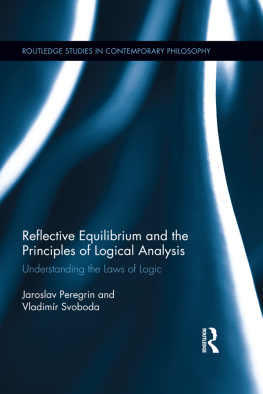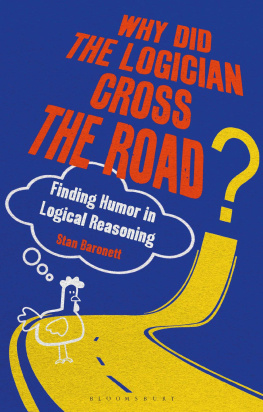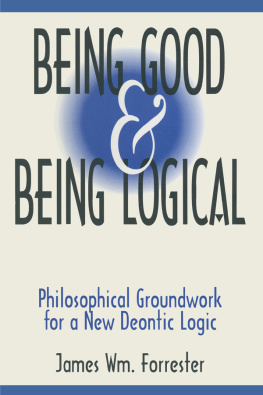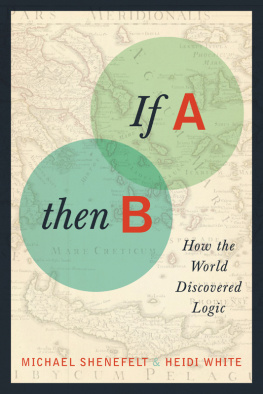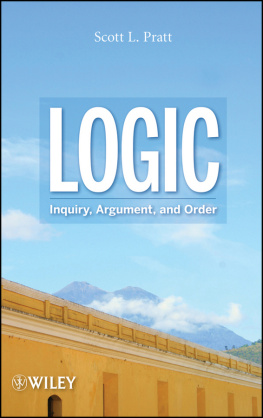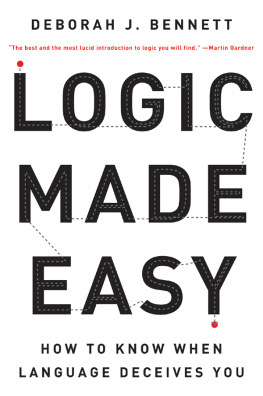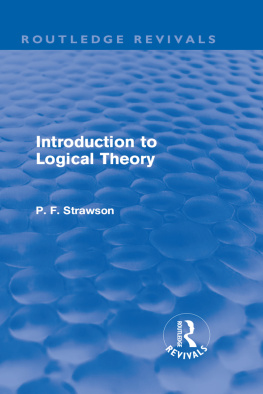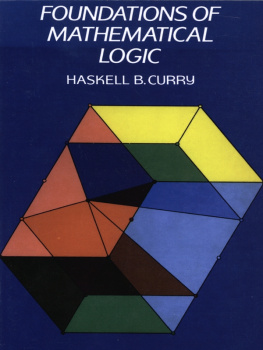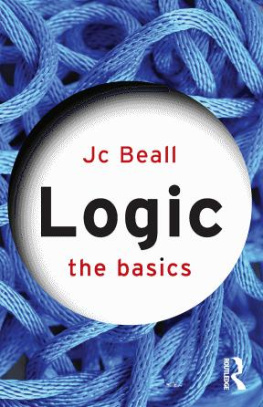First published 2017
by Routledge
711 Third Avenue, New York, NY 10017
and by Routledge
2 Park Square, Milton Park, Abingdon, Oxon OX14 4RN
Routledge is an imprint of the Taylor & Francis Group, an informa business
2017 Taylor & Francis
The right of Jaroslav Peregrin and Vladimr Svoboda to be identified as authors of this work has been asserted by them in accordance with sections 77 and 78 of the Copyright, Designs and Patents Act 1988.
All rights reserved. No part of this book may be reprinted or reproduced or utilized in any form or by any electronic, mechanical, or other means, now known or hereafter invented, including photocopying and recording, or in any information storage or retrieval system, without permission in writing from the publishers.
Trademark notice: Product or corporate names may be trademarks or registered trademarks, and are used only for identification and explanation without intent to infringe.
Library of Congress Cataloging-in-Publication Data
Names: Peregrin, Jaroslav, author. | Svoboda, Vladimir, 1960 author.
Title: Reflective equilibrium and the principles of logical analysis :
understanding the laws of logic / by Jaroslav Peregrin and
Vladimir Svoboda.
Description: New York : Routledge, [2017] | Series: Routledge
studies in contemporary philosophy ; 90 | Includes bibliographical
references and index.
Identifiers: LCCN 2016043194 | ISBN 9781138210967 (hardback : alk. paper)
Subjects: LCSH: Logic.
Classification: LCC BC71 .P47 2017 | DDC 160dc23
LC record available at https://lccn.loc.gov/2016043194
ISBN: 978-1-138-21096-7 (hbk)
ISBN: 978-1-315-45393-4 (ebk)
Typeset in Sabon
by Apex CoVantage, LLC
a priori ,
abstraction,
algebra, universal,
ambiguity,
analytic/synthetic distinction,
anaphora,
argument. see also
analytically correct,
analytically incorrect,
correct,
fallacious,
formally correct,
incorrect,
logically correct,
logically incorrect,
perspicuous,
reference,
sound,
status quo correct,
status quo incorrect,
argumentation,
arithmetic. see
asymmetry thesis,
attitude, normative,
axiom,
bivalence,
bootstrapping,
calculus,
predicate,
propositional,
chess. see
communication,
competence,
grammatical,
inferential,
compositionality,
computer science,
conditional,
conjunction,
constant,
extralogical,
logical,
contradiction,
criteria
of argument correctness,
of correct formalization,
of delmiting logical expressions,
of logical analysis,
equilibrium, reflective,
ethics,
event,
extension,
extensionality,
form
grammatical,
logical,
of argument,
of thought,
super-invalid,
surface,
valid,
vs. function,
vs. structure,
formalization,
game of giving and asking for reasons,
grammar,
imperative,
implication,
material,
indexical,
individual,
inferentialism,
intension,
interpretation,
intuition,
landscape, inferential,
language
artificial,
formal,
formalized,
hybrid,
logical,
natural,
of CPL,
language faculty,
language game,
law
of excluded middle,
of logic,
of nature,
of physics,
of truth,
linguistics,
logic
classical,
epistemic,
erotetic,
imperative,
intensional,
intuitionistic,
modal,
relevant,
mathematics,
meaning,
use theories of,
meaning postulate,
metalanguage,
metarule,
modality,
model theory,
modus ponens ,
naturalism,
negation,
neighbour, inferential,
parameter,
paraphrase,
Peano arithmetic,
perspective
atomistic vs. holistic,
internal vs. external,
Platonism,
pragmatism,
principle
of ambitiousness,
of parsimony,
of reliability,
of tolerance,
of transparency,
proof theory,
proposition,
proto-logic,
psychologism,
psychology,
quantification,
quantifier,
generalized,
reason. see
reasoning,
regimentation,
role, inferential,
rule
formation,
of argumentation,
of deduction,
of grammar,
of chess,
of inference,
of language,
of logic,
of reasoning,
strategic vs. constitutive,
structural,
syntactic,
transformation,
science,
empirical,
natural,
scope, intended,
semantic self-consciousness,
semantics,
generative,
proof-theoretic,
sociology,
structure
abstract,
deep,
grammatical,
holistic,
inferential,
logical,
of sentence,
of the world,
sentential,
surface,
syntactic,
syntax,
system
axiomatic,
grammatical,
logical,
of signs,
tautology,
tertium non datur,
translation,
truth,
analytic,
conceptual,
logical,
theories of,
truth bearer,
truth conditions,
truth preservation,
truth table,
truth value,
universe
of discourse,
of situations,
variable,
world, possible,
Routledge Studies in Contemporary Philosophy
For a full list of titles in this series, please visit www.routledge.com
82 The Epistemological Skyhook
Determinism, Naturalism, and Self-Defeat
Jim Slagle
83 Time and the Philosophy of Action
Edited by Roman Altshuler and Michael J. Sigrist
84 McTaggarts Paradox
R. D. Ingthorsson
85 Perspectives on Ignorance from Moral and Social Philosophy
Edited by Rik Peels
86 Self-Reflection for the Opaque Mind
An Essay in Neo-Sellarsian Philosophy
T. Parent
87 Facts and Values
The Ethics and Metaphysics of Normativity
Edited by Giancarlo Marchetti and Sarin Marchetti
88 Aesthetic Disinterestedness
Art, Experience, and the Self
Thomas Hilgers
89 The Social Contexts of Intellectual Virtue
Knowledge as a Team Achievement
Adam Green
90 Reflective Equilibrium and the Principles of Logical Analysis
Understanding the Laws of Logic
Jaroslav Peregrin and Vladimr Svoboda
Contents
Some parts of the book have been built on already published material. The chapters addressing the criteria of logical analysis and the reflective equilibrium have incorporated parts of our papers Criteria for logical formalization ( Synthese 190, 2013, 28972924) and Logical formalization and the formation of logic(s) ( Logique et Analyse 233, 2016, 5580), while partly overlaps with our paper Logically incorrect arguments ( Argumentation 30, 2016, 263287). Some of the arguments and examples presented here appeared in the Czech book Od jazyka k logice ( From language to logic ), which was published by Academia, Praha, 2009. We are grateful to Pavel Arazim, Georg Brun, Matej Drobk, Ulf Hlobil, Ansten Klev, Radek Ocelk, Vt Punoch, and Hans Rott for valuable critical comments to previous versions of the books manuscript. Greg Evans did, in our view, a great job proofreading the book as well as minimizing appearances of Czechisms. We are also grateful to the Institute of Philosophy of the Czech Academy of Sciences which provided excellent conditions for our research during the period when we worked on this book. The preparation of the book was supported by the research grant No. 13-21076S of the Czech Science Foundation.

